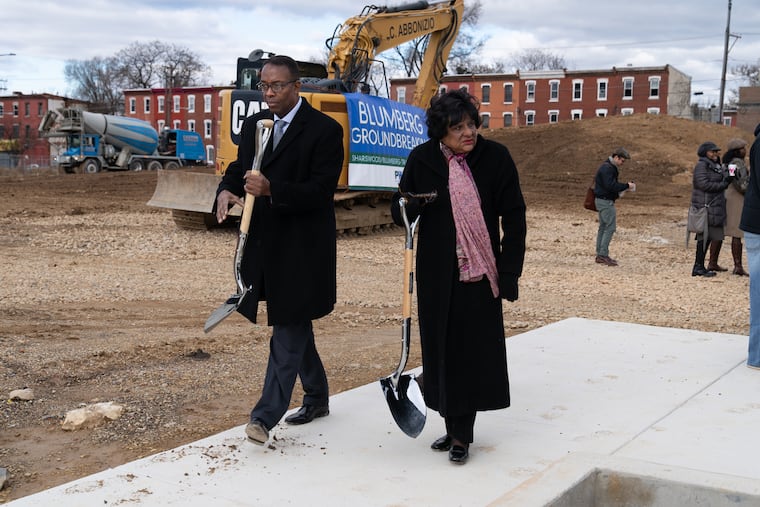Philadelphia City Council President Darrell Clarke proposes land sales reforms, defends ‘councilmanic prerogative’
City Council President Darrell Clarke says he wants to close loopholes in Philadelphia’s disjointed land disposition process following news reports of no-bid sales that enabled developers to buy public lots cheaply then build expensive homes there – or re-sell them for large profits.

City Council President Darrell L. Clarke proposed legislation Thursday to close loopholes in Philadelphia’s disjointed land sale process that have enabled developers to buy public lots below market value, then develop or resell the properties for large profits at taxpayer expense.
Clarke’s bill follows Inquirer and Daily News reports outlining how developers had taken financial advantage of shortcomings in the system.
The legislation would require city approval before a purchaser could resell property acquired from the city. It also calls for the city’s Vacant Property Review Committee – whose chair is appointed by Clarke – to review the appraisal of a property’s fair market value before sending it to the Philadelphia Redevelopment Authority, which is responsible for executing the sale.
Clarke also said he wants to make it easier for the city to revoke a land sale when a purchaser doesn’t follow through with a proposed plan or lets the property sit for more than 18 months without development.
“At that time, we’re going to send inspectors out, and if you’re not doing something, we’re going to start the revocation process,” Clarke said.
The legislation was introduced on Clarke’s behalf by Councilman Kenyatta Johnson, whose district has been a hotbed for questionable land deals.
“I’m on board with it,” Johnson said before the Council session.
Johnson also introduced his own resolution Thursday calling for hearings into how public land is appraised, sold, and monitored.
“Too many mistakes are being made without consequence or consideration of the impact on the city, and there is no accountability," he said in a statement. "It’s unacceptable, and I am committed to fixing it.”
However, it was Johnson’s support that enabled developer Felton Hayman to purchase city land that he turned around and sold for a large windfall.
Last month, the Inquirer and Daily News reported that Hayman, a childhood friend of Johnson’s, was able to turn a $165,000 profit in September by flipping two Point Breeze lots he had purchased from the city a month before at a fraction of their market value. He was able to purchase the properties without competitive bidding because of Johnson’s support, officials said.
Last week, the newspapers reported that the Vacant Property Review Committee had approved selling three other Point Breeze lots to Hayman at below market value in a no-bid sale. That sale, too, was supported by Johnson.
The committee’s records initially listed the deals as “side yard” sales, not for development. The records also failed to disclose that other developers had expressed interest in the properties, which should have triggered bidding. Hayman told the committee his homes would be priced at “under $250,000.” He ultimately built homes that sold for between $325,000 and $415,000.
Other developers, including campaign contributors, backed by Johnson have in years past benefited from similar deals.
Johnson has said he did not set the prices in the Hayman sales and was not aware that other developers were interested in the properties. He blamed the miscues on the city’s landholding agencies: the Department of Public Property, the Redevelopment Authority, and the Land Bank.
“All the failures that followed – from under-appraisal of the property to the brazen flip of the property just weeks after closing – are the result of the broken process in the city’s agencies,” Johnson said in a statement Wednesday. “If the city can’t properly price properties and enforce deed restrictions, every transaction is a potential land mine.”
Last month, the FBI subpoenaed the city for records pertaining to the Hayman sales over the summer, sources said.
Mayor Kenney and others have placed much of the blame for the questionable sales on “councilmanic prerogative,” the unwritten tradition under which Council members will not introduce or vote against resolutions involving land sales in another member’s district. That effectively gives each district Council member a veto over most development. Critics have charged that Council members use that power to steer city properties to favored developers.
Clarke stood by the tradition Thursday, saying it is the most practicable way to handle the land disposition resolutions required under the City Charter.
“These Council districts are large – 160,000 people. To be honest with you, I have enough difficulty trying to follow the nuances of property disposition in my district," he said.
Kenney spokeswoman Deanna Gamble said in a statement that the administration had been working to implement some of Clarke’s proposed changes without the need for legislation.
“This bill would, however, formalize the changes to ensure that they extend beyond the current administration," she said. “The mayor will be directing the public property commissioner to implement them as soon as possible. We are also making improvements to disposition operations and expect to make an announcement in the next few weeks after we consult with City Council.”
On Wednesday, the Philadelphia Coalition for Affordable Communities, a 62-member group that includes community, labor, disability, faith, and urban agriculture organizations, called on City Controller Rebecca Rhynhart to review five years of land sales, particularly how “councilmanic prerogative” may have impacted them. Rhynhart said she would consider it.
Staff writer Mark Fazlollah contributed to this article.